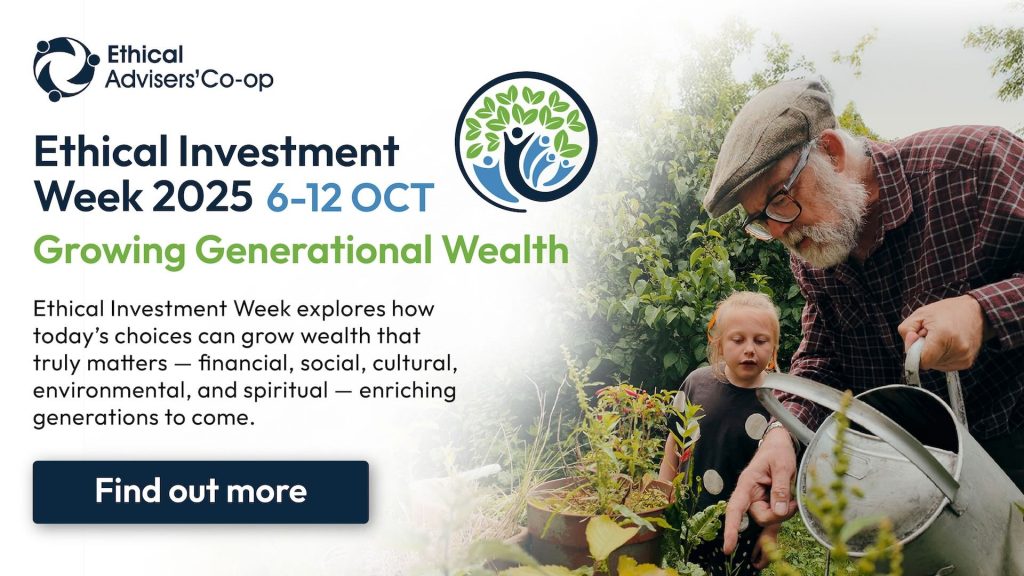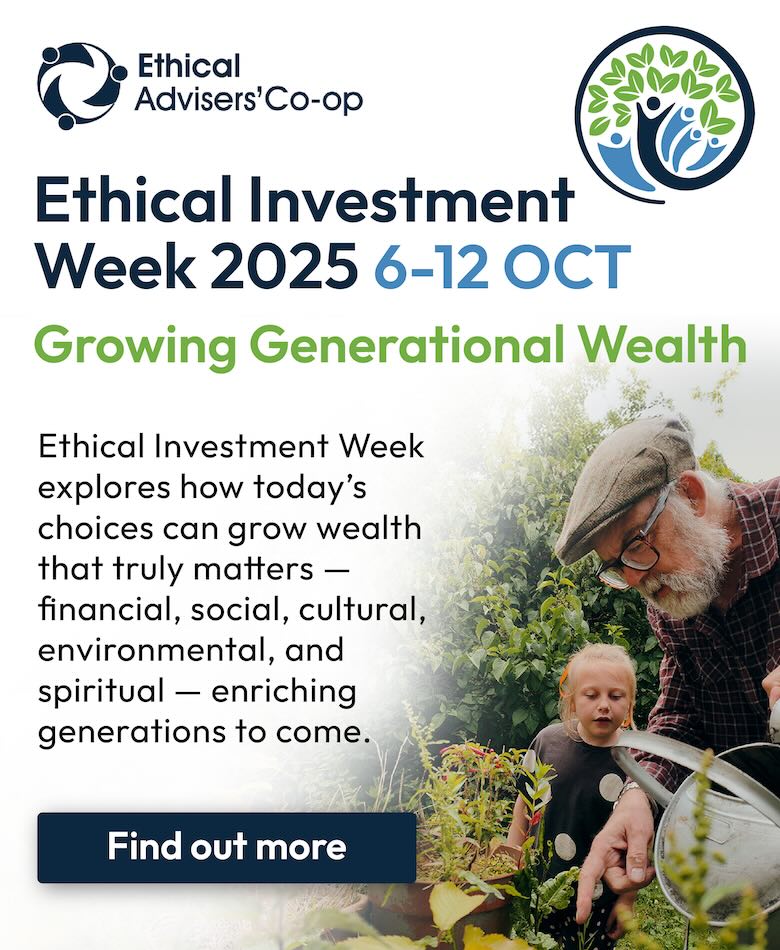Ethical Investment Week
6 – 12 October 2025
Each year, Ethical Investment Week highlights the objectives and benefits of ethical investments and advice.
The 12th annual Ethical Investment Week in 2025 will focus on the strong connection between Ethical investing and Growing Generational Wealth.
Ethical Investment Week 2025 focuses on helping you as an individual investor explore how you can grow wealth that truly matters – financial, social, cultural, environmental and spiritual – enriching generations to come.
As part of Ethical Investment Week, members of the Ethical Advisers’ Co-op will be presenting a range of resources, including short courses, seminars, podcasts and hosting other events at various locations around Australia and New Zealand.
Take Action This Ethical Investment Week
During the week, you can:
- Join seminars and webinars to explore how to align your portfolio with your values
- Access short courses on ethical investment with practical steps for investors of all ages and circumstances
- Be inspired by Future Council and other events designed to show how we can all make a positive impact
Ethical Investment Week Events
| Date | Organiser | Event | Location | Details |
|---|---|---|---|---|
| Tuesday 7 October 2025 | TasEthical | Climate Change, Tasmania’s Fire Risk & Your Retirement | TBA | Link to RSVP (TBA) |
| Wednesday 8 October 2025, 5:30pm | Ethical Investment Advisers | Private Cinema Screening of FUTURE COUNCIL | New Farm Cinemas, Brisbane | Link to RSVP |
Why This Matters for You
“Younger investors plan to increase sustainable allocations at higher rates — they are the future of wealth stewardship.”
- Morgan Stanley Sustainable Signals
Australia is about to experience the largest transfer of wealth in its history. Over the next 20 years, between $3.5–$5.4 trillion will move from one generation to the next. Most of it will be in property and superannuation — assets many Australians hold today. At the same time, 88% of Australians now expect their investments to be managed responsibly and ethically.
People over 55 hold 60% of New Zealand’s $2.29 trillion wealth. $1.11 trillion will be transferred in the next 20 years. 75% of New Zealanders expect their investments to be managed ethically and responsibly.
Globally, around USD 83 trillion will be transferred over the next 25 years.
- The US alone accounts for USD 29 trillion.
- Women and younger investors (Gen Z and Millennials) are increasingly directing these funds — and they overwhelmingly prefer ethical, sustainable investment strategies.
Research Spotlight
- 88% of global investors are interested in sustainable investing
- 99% of Gen Z and 97% of Millennials express strong interest
- 59% plan to increase sustainable allocations in the coming year
- 80% would choose an adviser or platform based on sustainable offerings (96% of Gen Z; 92% of Millennials)
(Source: Morgan Stanley Institute for Sustainable Investing – Sustainable Signals, 2024)
How to Make Ethical Investing Part of Your Legacy
Here are three steps to consider:
- Choose an Adviser Who Understands Your Values
Work with a financial adviser who specialises in ethical investing. They’ll work to understand your values and help ensure your portfolio reflects what matters most to you.
- Formalise Your Wishes
Include your ethical investment intentions in your will, trust, and estate plan. This could mean directing funds to be managed sustainably or setting up structures that ensure the wealth you leave via this legacy is invested ethically and will continue to reflect your values long after you’re gone.
- Educate others and the next generation
Talk to others, including your people in your life, about investing in line with their ethics. Share your story about why and how you invest ethically helps others see the impact their choices can make. Provide them with resources and guidance on ethical investing so they can make informed decisions – your ethical adviser can help with this.
Experience the Next Generation’s Voice: The Future Council
As part of Ethical Investment Week 2025, some members of the Ethical Advisers Co-op will host screenings of ‘Future Council’, the new film by award-winning director Damon Gameau (2040, ‘That Sugar Film’).
The film follows eight children, aged 11–14, on an extraordinary journey across Europe in a bus powered by biofuel. Their mission: to confront global challenges, explore solutions, and speak directly with leaders of some of the world’s most powerful companies.
Future Council Ltd, the not-for-profit behind the film, is a child-led global movement connecting young people aged 9–16 with businesses, schools and institutions to design a better future. 75% of the Producer’s profit share will be donated to Future Council Ltd.
The following are extracts from a ‘Reality Roundtable’ titled: ‘Future Council: How Children are Responding to our Planetary Crises’ hosted by Nate Hagens, the Director of The Institute for the Study of Energy & Our Future (ISEOF), an organisation focused on educating and preparing society for the coming cultural transition.
Q: What inspired you to make this film, and what was the first process of you thinking about how it would unfold?
A: I did a film back in 2019 called 2040, which was a sort of vision of what the future might look like if we enacted all of the best ecological solutions. And the narrative for that was based on interviews with about 130 children from around the world, from Tanzania to Stockholm to New York.
And in that process, it was pretty revealing how eloquent the children were and how much they knew about some of these issues. And that really, especially when we did the Q and A’s for the film, they just had such terrific suggestions, but there was clearly no outlet for them to express their insights, but also their fears. And that’s why I think we saw them start to take to the streets, which is an extraordinary thing in itself.
But I really did think that they needed to have their voices amplified in some way. And so could we make this film? And then, as we made the film, the children, as we went along, realised that they do have potency in this moment. And so could we create some kind of ecosystem or platform where they are meeting other children around the world that are as passionate as them, and let them feel like they are being heard?
Q: So what did you learn? I mean, that was your plan, but when you made the film, and you got to know these eight young, 11 to 14 year olds. Did that change the way you think about all of our global problems, the meta crisis, climate change, the future? What were your experiences?
A: It’s definitely the most profound film experience I’ve ever had, and I think I didn’t expect it, but the children cracked me open. In a sense, they got me in my heart. And I think all of us, yourself included, that do this work, you can get really focused on the tech and the governance and the different policies, but the actual change that’s needed is a much deeper. It’s a values shift. And the children, I think, provide the simplicity of that. They’re almost like a moral compass, and they unlock awe and wonder and creativity, all the things we’ve neglected because we’ve over complicated this system. So I do think they have an incredible power and potency in this moment. I mean, as you know, obviously you talk about energy blindness. There’s a morality blindness in most corporations as well, they’re not actually aware of the psychopathic actions they’re taking. So to have a child present, which I saw making this film, it humanized these CEOs again. They dropped the mask, and they had to think differently about the decisions they were making. And that is their great superpower.
Q: I’ve increasingly been thinking about these CEOs and anyone, we all wear three hats. The one hat is we’re part of the economic system. We have to make wages or profits, or we have a boss. And the second is, we want to live a good life and enjoy ourselves. And the third is we want to be good ancestors and do what’s right for other species in the planet. The problem is, and this is the character Groth in your movie, is there’s this emergent organism, and the incentives and the prices and the structures don’t allow an individual human to wear all those three hats at the same time. And it’s starting to be really be fractured, like these CEOs and these high level people, they feel the heart, but the structure they’re embedded in is constraining them.
A: Yes. One of the children said that on the trip that we’re all trapped in the system, and that even the people that we met have children and deeply care about the future, but they are deeply intertwined in something they can’t unravel from, and I think that’s a major reason why we haven’t taken the action that we have. So I think that’s the power of the children in this moment, is that they are a little bit separate and free from that. They look at it from a different perspective, and they bring a freshness that we need right now.
It’s actually a cut through of common sense that says what you guys are doing is actually bat shit crazy, and you’re calling it progress, but you’re polluting the soils and the atmosphere and the water. Can we actually think about doing this a little bit differently? And so I think we need to be careful that we’re not exploiting them in this moment, but I do think they have an incredible potency to offer, and that’s what I hope happens with this entire Future Council, as we get more and more children from around the world that are collaborating and inspiring institutions and businesses that they do offer something different. They do allow and give permission to dream again, for these companies to think about that better future, to think about their ancestry, but also to say, hey, what’s the right thing to do here? Because we’ve kind of been blindly making these decisions, and now there’s a consequence sitting right here at the table.


